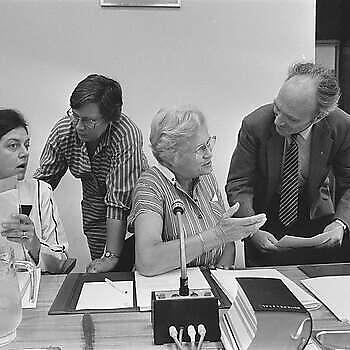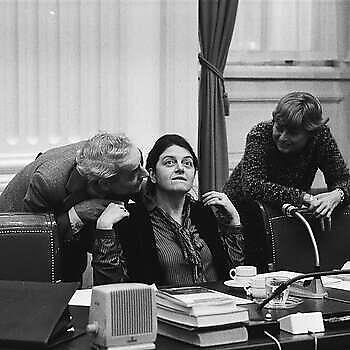When the First Lubbers Cabinet took office, the Dutch economy was struggling. Many budget cuts were deemed necessary, including in the expenditure budget for development cooperation. A total of 3.75% was cut, which amounted to 280 million guilders. These cuts also made it necessary necessary to revise the strategy for development cooperation. The Lubbers I cabinet clearly stated in the 1982 coalition agreement that \Dutch development cooperation must respond to the opportunities and capacities of the Dutch economy and society.’ It was the first time that the voice of the VVD was so clearly heard in the field of development cooperation. In addition to a focus on the capacities of the Dutch economy, the coalition agreement also stipulated that the Netherlands should collaborate with: ‘poor countries whose socio-economic policies were clearly aimed at progress and with whom a sustainable relationship could be built’. This clearly indicated that development cooperation was aimed at the interests of the Netherlands.
After a year and a half, a Bilateral Policy Reassessment Note was published in 1984, after several internal versions. This note presented the objectives as a synthesis of both policy tracks, namely poverty reduction and self-reliance through structural poverty reduction. There was much criticism of this note because of the emphasis on the role of the private sector. Just after this note, Schoo issued another note on Development Cooperation and Employment, in which she tried to further accommodate the private sector. This note also stated that economic recovery in developed countries (the industrialized world) was in the interest of developing countries. According to the media, however, this note placed too much emphasis on Dutch interests. At the same time, The Hague felt that it did not go far enough.
In addition to the Bilateral Policy Reassessment Note, 1984 also saw the results of the Global Evaluation of Dutch Bilateral Development Cooperation published. This evaluation mainly focused on the policy of the past 10 years, which was divided into two sub-periods before and after 1979-1981. This was because an internal reorganization took place between 1979-1981. The evaluation noted that many projects before 1980 had not met the expected results, for which various reasons were given (such as a lack of policy structure and knowledge of local situations). This was mainly attributed to a lack of proper research, although good research does not guarantee success. However, the evaluation also mentioned that there was hope for the years after 1980, due to the aforementioned reorganization. But it was still too early to draw conclusions at that time.
Financial reservoirs
Until the mid-1980s, development cooperation was not covered by the accountability law. Expenditures on developing countries were sometimes difficult to plan, so they could not be spent in the budget year. Money that could not be spent immediately ended up in a so-called financial ‘reservoir.’ The money in this reservoir was actually never spent, so it grew rapidly, especially in the 1970s. This caused irritation at the Ministry of Finance because they were always waiting for the final settlement of development cooperation. In 1981, it was decided to use the money from this reservoir, which resulted in suddenly higher expenses for development cooperation. In response, Minister Van der Stee (Finance) decided to establish a budget ceiling in 1982, which meant that the money from this reservoir could no longer be used.
Minister Ruding went a step further and forced Schoo to give up her claims on the reservoir. As a result, the money that was intended for development cooperation was no longer being used for this purpose. This meant that in the years before Schoo, less money was spent on development cooperation than had been agreed upon. In 1985, a compromise was reached: the money in the reservoir had to be surrendered and in exchange, Schoo was allowed to spend some extra money in the coming years. The condition was that no new reservoir could be built in the future, and all budgeted funds had to be spent in the same year.
Civil society organisations
In the 1980s, in the Netherlands, many ‘country groups’ were active who showed solidarity with resistance movements in countries such as South Africa, Chile, or El Salvador. They provided practical and financial support, as well as organizing demonstrations and actions.
Development thinking
At the same time, there was a significant change in economic thinking. Neoliberalism became dominant worldwide, with the International Monetary Fund (IMF) and the World Bank in Washington exerting a heavy influence on development policy. Developing countries had to implement structural adjustment programs (SAPs) in exchange for loans, such as cutting government spending, opening their markets to foreign companies, and focusing their own economies on exporting raw materials.
Furthermore, there was growing global attention to the cultural context in which aid was given. This made the position of women more important and emphasized breaking (according to Western society) "traditional social structures." During this period, more importance was also attached to the environment, which led to the beginning of creating conditions for sustainable development.
Sources:
- Ontwikkelingssamenwerking in vogelvlucht.
- Paul Hoebink, Hoe de dominee de koopman versloeg, internationale spectator (2006)
- Nederlandse Ontwikkelingssamenwerking 1949-1989
- Biografie Eegje Schoo
- Paul Hoebink: Geven is nemen: De Nederlandse Ontwikkelingshulp aan Tanzania en Sri Lanka (1988)
- Globale Evaluatie van de Nederlandse Bilaterale Ontwikkelingssamenwerking
- Coppens, H.A.J. (2019), "Ministers voor de schone schijn? De eerste vijf ministers voor Ontwikkelingssamenwerking van Nederland", Hoofdstuk 4t/m7
Notes:
Extra Sources:
- Jaarverslag Ontwikkelingssamenwerking 1984, * (1988), NICC collection, A00785
- NAR-advies, no.87


